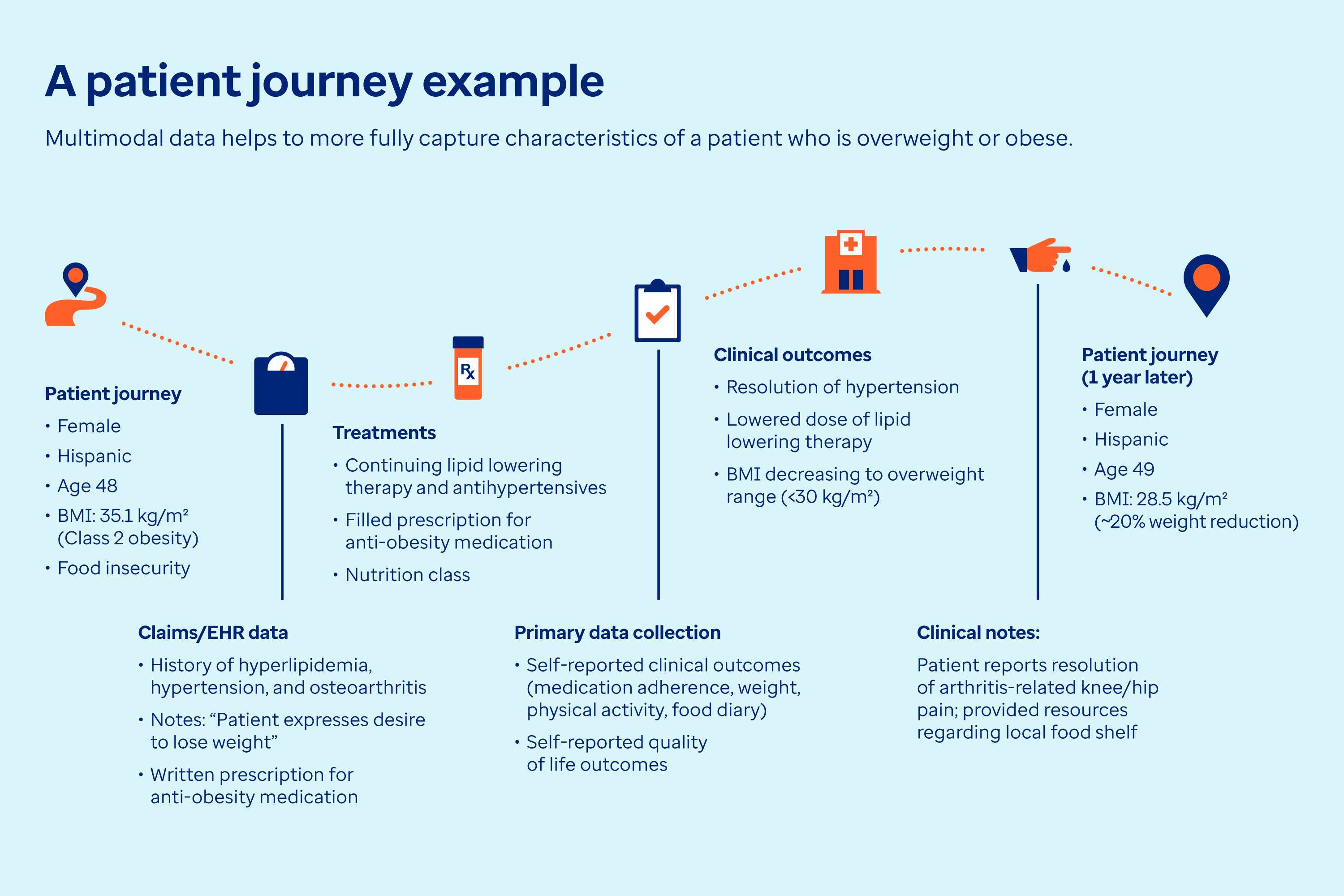Optum Life Sciences expert provides insights on the latest trends.
GLP-1s continue to dominate the rapidly evolving treatment landscape for patients who are obese and overweight. For manufacturers developing GLP-1s or in the market, it’s invaluable to understand the nuances of how real-world evidence (RWE) can be harnessed to demonstrate the clinical and economic value of weight loss medications.
Optum Life Sciences researchers stay up-to-date on the latest in research and how it may affect access for patients. They also attend conferences such as ObesityWeek, an international conference for obesity researchers and clinicians, to learn the latest developments and participate in discussions on evidence-based obesity and overweight science.
One of our researchers, Noelle Gronroos, PhD, the Endocrine/Metabolic Therapeutic Lead on our Value & Evidence Solutions (VES) team at Optum Life Sciences, recently shared her observations and insights from this past year, including attending ObesityWeek last fall.
How has the focus of ObesityWeek changed in the past few years?
Dr. Gronroos: ObesityWeek has significantly shifted its focus over the years, particularly towards pharmaceutical treatments for obesity. Initially, GLP-1s were used to treat patients with type 2 diabetes and they found it could also address patients with type 2 diabetes who were also overweight or obese.
The emphasis in obesity treatment was on lifestyle interventions, but with the advent of treatments like the once-weekly GLP-1 medications, the focus has moved towards demonstrating the effectiveness of anti-obesity medications and their clinical benefits in trials and real-world clinic settings.
More recently, while pharmaceutical companies continue to evaluate the efficacy and safety of these treatments, they are also more engaged in discussions regarding the impact of pharmacotherapy on patient health beyond just weight reduction.
In the past, there wasn’t really a truly effective way to achieve significant weight reduction for a large population. Intensive lifestyle intervention results in ≥10% weight reduction for less than a third of patients, and only about 20% can maintain that weight loss long-term. Bariatric surgery is effective, but it is not used by a high percentage of the eligible population. Newer anti-obesity medications are bringing about weight reduction that wasn’t typically seen with diet and lifestyle intervention alone.
Given the population level impact, what are researchers studying now?
Dr. Gronroos: This new paradigm has created a need to explore the myriad of potential benefits related to pharmacological treatment since such a large proportion of the population qualifies for anti-obesity medications due to their risk of obesity-related health impacts. In the short term, there’s potential to reduce knee and back pain, improve activity levels and improve mental health which has profound impact on a multitude of other conditions.
However, despite its effectiveness, adherence with GLP-1s can be challenging in the short- and long-term. There are two critical areas to address at this time: understanding the root causes of poor adherence to these medications and innovating on the medication dose and delivery to improve tolerability and longer-term utilization to enable the realization of potential lasting health outcomes.
How are manufacturers developing their value story for weight loss medication for clinicians and payers?
Dr. Gronroos: The trend is towards demonstrating the clinical value of these treatments in real-world settings. The short-term benefits of GLP-1s and other weight loss drugs include weight reduction and improvements in metabolic health, and longer-term benefits being studied include reductions in cardiovascular events and other obesity-related complications. These studies aim to demonstrate the sustained health benefits of these medications, which is crucial for gaining support from payers and clinicians.

How can real-world data help show the value of weight loss medications?
Dr. Gronroos: Real-world data can help to identify short-term and long-term effects of anti-obesity medications among patients seen in clinical practice. In a recent real-world study in Optum Health, we learned that providers do not always prioritize discussions about overweight and obesity while attending to other primary health conditions. The patient is often likely to initiate discussion and there needs to be a fair balanced review of the options.
Real-world data will be crucial in documenting the changes in patients utilizing these medications outside of the rigorous trial environment. For instance, trial participants were dose-escalated to a maximum dose set by randomization, and that escalation was based on a predefined schedule irrespective of weight reduction trajectory or occurrence of side effects. In clinical practice, patients are generally titrated to the lowest effective dose on a schedule that can allow additional time at a lower dose to acclimate/adjust to side effects.
Another difference is that real-world patients commonly experienced medication interruption and discontinuation due to shortages and pharmacy coverage, so real-world data will allow us to investigate whether patients who discontinue treatment experience the same level of weight regain that was seen in the trials.
Real-world data may also help highlight potential benefits beyond weight reduction. These include outcomes investigated during the trials, such as improvements in cardiovascular health, improvements in quality of life and reductions in obesity-related complications. Benefits may also include outcomes not measured in the trials, like workplace productivity and absenteeism — these can be important factors to consider when making decisions regarding employer-sponsored health coverage.
How can Optum Life Sciences assist pharmaceutical companies in showing the value of their weight loss drugs?
Dr. Gronroos: Optum Life Sciences are experts in the real-world data we provide, and we can leverage a comprehensive understanding of patient journeys through diverse data assets, and solutions that address primary and secondary adherence. By compiling de-identified data from primary data collection, surveys, clinical notes, EHR data and administrative claims data, Optum can demonstrate both short-term and long-term clinical benefits of anti-obesity medications.
Additionally, our analyses can address the biases and confounding factors that are not seen in clinical trials and which may affect treatment outcomes. This data-driven approach helps pharmaceutical companies present compelling evidence of the effectiveness and additional benefits of their medications, and this evidence is vital for convincing payers and employers of the value of these medications.
To learn more, contact Optum Life Sciences.





Join or login to leave a comment
JOIN LOGIN